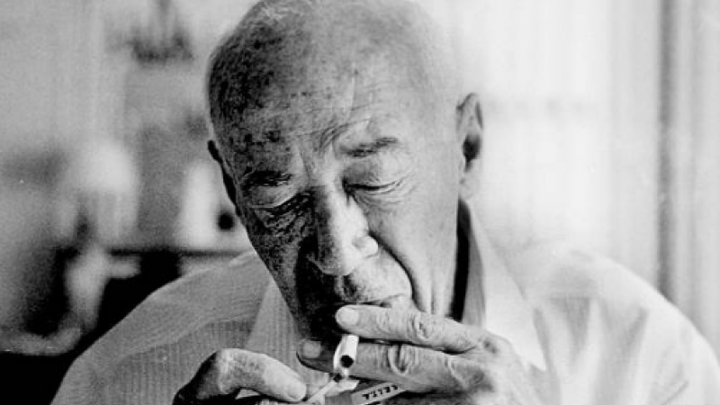
A Book on Henry Miller
Donation protected

American Sage or Sexist?
Henry Miller’s Legacy in American Literature
Henry Miller mentioned the peace, the quiet and the fog rolling in and out over the velvety hills and blessed it, for here, Miller argued, man could hide from all of the world’s ugliness and experience the serene security created by a handful of people who lived in harmony with nature. He was referring to Big Sur, a garden of earthly delights he called home, if not heaven after moving back to the US from Europe.
While the fifties and sixties in the San Francisco Bay Area were dominated by the noise of the counter culture of Beats, hippies and protesting students, Miller withdrew from what he had once called “the air-conditioned nightmare” of American life.
In his very own way, Miller had contributed to a counter culture of sorts, or rather he was the eye of his own storm with the publications of his early work which was declared obscene and banned for years, so it could not appear on the bookshelves of American libraries and bookshops.
Due to the condemnation of his early work, and a further destruction of his literary reputation by the perceived misogyny in his work by the feminists of the 1970s, Miller has remained misunderstood for most of his life and afterwards, even though a later work like Big Sur and the Oranges of Hieronymus Bosch clearly shows a devoted and original artist who was constantly assessing the power and purpose of his own writing and his uncertain place in the American canon.
While the shock value and sex of his early work already had an aesthetic function of its own, most succinctly and concretely articulated by fellow novelist Erica Jong (“a way out of the body, through the body”), in his Big Sur memoir, the catharsis of the sexual element of his early work is replaced with the divine catharsis of an inspired and transcendentalist reality which turns Miller into an important, yet solitary bridge figure between Walt Whitman and Jack Kerouac.
Finally, Miller’s disruptive discourse of (sex) and self-examination, i.e. his mixing of autobiography, memoir and fiction, have come to define his art and his legacy as a confessional author and pioneer of New Journalism. By connecting Miller’s early oeuvre with his later oeuvre, I hope to prove that Henry Miller is not a mere footnote but was an indispensable modernist and postmodernist force in twentieth century literature, whose originality and innovation have been overlooked and neglected by an early bias that was puritanical, feminist and inappropriate.
Since I'm an independent scholar, I would need funds to finance the travel to research libraries where most of Miller's papers and correspondence are held. If there's any money left, I will use that to take time off of work to pen this book.
But what's in it for you?
This book is a cherished dream of mine and I would be eternally grateful if we can make it happen. Anyone who contributes will be mentioned by name in the acknowledgments (provided you want to be named) of this book which I hope to publish with a major university press. In addition, I will have a signed copy of the book delivered to your house and I can do a Henry Miller reading/talk at your request, free of charge.
Aside from the academic merits of this book, I feel strongly Henry Miller's legacy and outlook on life speak to us in these dark and troubling times. Miller is now a mere sputtering candle in the wind but hopefully this book will keep the Miller flame going, and at best, trigger a Henry Miller revival that will enlighten us all.
Organizer
Inez Hollander Lake
Organizer
Orinda, CA


